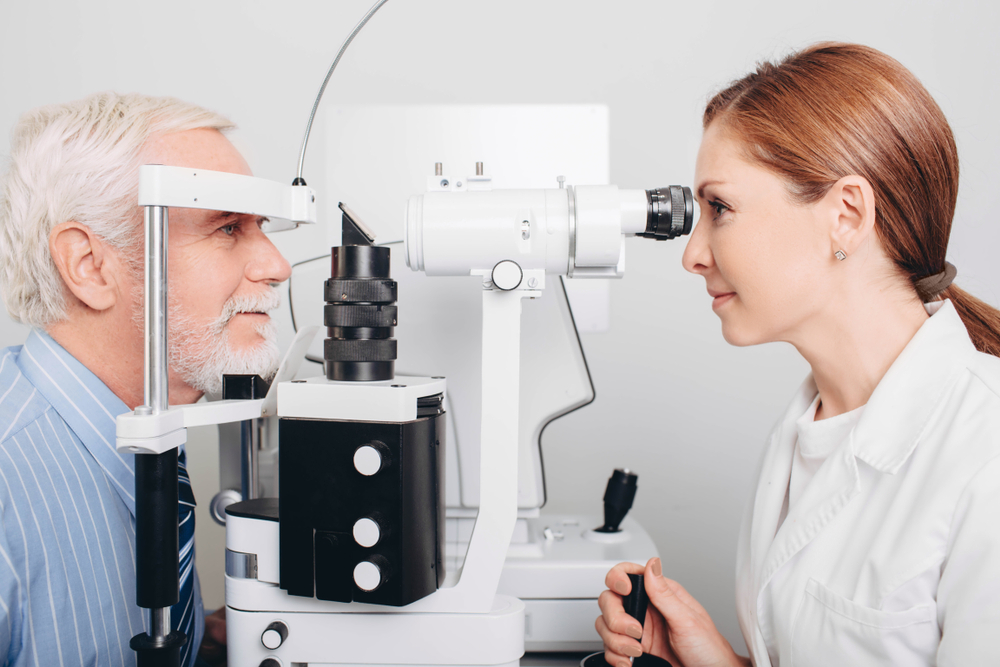Your everyday choices have a profound impact on your eye health. From the foods you eat to the way you work, seemingly small decisions can add up to make a big difference in the long-term health of your eyes.
In this fast-paced world, it’s easy to overlook some seemingly small aspects of your daily life that affect your eye health. However, these choices compound over time, either supporting or potentially harming your vision and eyes.
Keep reading to learn seven lifestyle-focused tips that can help you maintain clear vision and healthy eyes. By incorporating these practices into your daily routine, you’re not just caring for your eyes – you’re enhancing your overall quality of life!
1. Schedule Regular Eye Exams

Your eyes are windows to your overall health, and regular check-ups are crucial. Even if you think your vision is perfect, comprehensive eye exams can detect early signs of eye diseases or other health issues.
At Blaine Eye Clinic, our eye doctors recommend annual eye exams for most adults. These check-ups allow your eye doctor to monitor your eye health and make necessary adjustments to your vision correction.
Since early detection and treatment are essential to avoid potential vision loss that can occur with various eye conditions, regular eye exams can help you ensure that you experience clear vision and healthy eyes for years to come.
2. Nourish Your Eyes with a Balanced Diet
You’ve heard the saying, “You are what you eat,” and this applies to your eyes, too. A diet rich in vitamins A, C, E, and omega-3 fatty acids can help maintain eye health.
Include plenty of green leafy vegetables, fish, eggs, nuts, and citrus fruits in your meals. These foods contain nutrients that support various eye functions and may help prevent age-related eye conditions.
Antioxidants like lutein and zeaxanthin, found in high concentrations in kale, spinach, and other leafy greens, are particularly beneficial for protecting against macular degeneration and cataracts.
3. Shield Your Eyes from UV Rays

Sunglasses aren’t just a fashion statement – they’re a crucial tool for eye protection. Ultraviolet (UV) rays can damage your eyes and increase the risk of cataracts and macular degeneration.
When choosing sunglasses, look for pairs that block 99% to 100% of both UVA and UVB rays. Remember to wear them even on cloudy days, as UV rays can penetrate cloud cover.
For added vision protection, consider wearing a wide-brimmed hat along with your sunglasses, which can block up to half of the UV rays that might still reach your eyes from around your sunglasses. If you spend a lot of time outdoors, especially near water, snow, or at high altitudes where UV exposure is intensified, you might want to invest in wrap-around sunglasses.
4. Give Your Eyes a Break from Screens
With so many people having jobs that use the computer, it’s common to spend hours each day staring at screens. This can lead to digital eye strain, causing discomfort and potentially impacting your vision over time.
Eye doctors recommend following the 20-20-20 rule: every 20 minutes, take a 20-second break to look at something 20 feet away. This simple habit can significantly reduce eye strain and discomfort.
Position your screen about an arm’s length away and slightly below eye level to reduce neck strain and minimize dry eye symptoms.
5. Stay Hydrated for Eye Health
Proper hydration is essential for your overall health, including your eyes. Drinking enough water helps maintain the natural moisture level in your eyes, preventing dryness and irritation. Aim for at least eight glasses of water a day, and consider using artificial tears if you experience persistent dry eyes.
Dehydration can affect the quality of your tears, potentially leading to a condition called dry eye syndrome, which can cause discomfort and blurred vision. Additionally, certain environments and activities can increase your eyes’ need for hydration, such as air-conditioned offices, prolonged screen time, or spending time outdoors in windy conditions, so you may need to increase your water intake in these situations.
6. Quit Smoking for Better Vision
If you smoke, here’s another reason to quit: smoking significantly increases your risk of developing eye diseases such as cataracts and age-related macular degeneration. It can also worsen dry eye syndrome.
By quitting smoking, you’re not only improving your overall health but also protecting your vision for the future.
7. Prioritize Quality Sleep
A good night’s sleep isn’t just crucial for your body and mind – it’s also essential for your eye health. During sleep, your eyes are replenished with vital nutrients and given a chance to rest from daily strain. Aim for 7-9 hours of quality sleep each night to help your eyes recover and function at their best.
How Do I Know When It’s Time for an Eye Exam?

While annual eye exams are recommended for most adults, certain signs may indicate you need to schedule an appointment sooner rather than later. Experiencing frequent headaches, squinting more than usual, or noticing increased sensitivity to light could all signal that it’s time to visit your eye doctor.
Changes in your night vision, such as difficulty driving after dark or seeing halos around lights, may mean you need professional attention to ensure your eyes are functioning properly. Additionally, if you’ve noticed any sudden changes in your vision, such as floating spots, flashes of light, or blurry patches in your field of view, it’s important to schedule an immediate eye exam as these could indicate more serious underlying conditions.
By incorporating these seven tips into your daily routine, you can significantly improve and maintain your eye health. Remember, your eyes are irreplaceable, so it’s crucial to take good care of them.
If you have any concerns about your eye health or are due for an eye exam, schedule an appointment at Blaine Eye Clinic in Blaine, MN, today!





